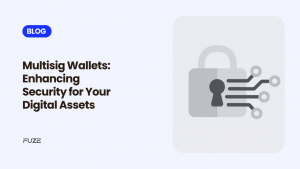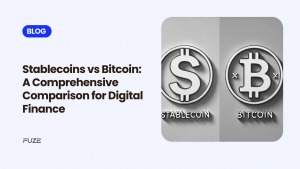In the fast-evolving world of business-to-business (B2B) transactions, seamless payments are the backbone of global commerce. However, even as technology advances and markets globalize, B2B payments continue to face challenges. With businesses operating across borders, managing larger transaction volumes, and navigating diverse regulatory environments, payment inefficiencies can lead to payment inefficiencies that strain cash flow, damage supplier relationships, and hinder growth.
As we navigate through 2024, it is essential to understand and implement effective solutions to these problems in order for businesses to grow. In this blog, we will discuss the most pertinent B2B payment challenges and actionable strategies including how Fuze’s innovative payment solutions can help overcome these hurdles.As we move through 2024, understanding these challenges and implementing effective solutions is crucial for businesses to thrive. In this blog, we’ll explore the most pressing B2B payment challenges and actionable strategies, including how Fuze’s innovative payment solutions can help overcome these hurdles.
Key B2B Payment Challenges in 2024
- High Transaction Costs
Traditional B2B payment systems, especially those dependent on banks, are often expensive to operate. These include wire transfer charges, FX costs for cross-border transactions, and fees for intermediary services. For businesses with tight margins, these costs can erode profitability.
Solution:
Fintech platforms offer cost-efficient alternatives by eliminating intermediaries and leveraging blockchain-based payment systems. Cryptocurrencies, for instance, can bypass FX rates entirely, providing significant savings for cross-border transactions.
- Slow Payment Processing
Delayed payments are a persistent problem in B2B transactions, which arise from the cumbersome traditional banking processes, miscommunication, or system inefficiencies.
Solution:
Real-time payment systems can help to solve this problem by allowing immediate fund transfers. Businesses should embrace systems that allow for automatic scheduling and reconciliation of payments to streamline workflows and minimize delays.
- Lack of Payment Transparency
Businesses face a lack of transparency in payment status in traditional payment systems. The use of intermediaries, especially in cross-border payments, complicates tracking of the funds, leading to uncertainty and increasing the operational workload.
Solution:
Blockchain technology has the advantage of providing transparent, traceable payment records.
4. Cross Border Payments
Cross border B2B transactions have various complexities that include fluctuating FX rates, varying regulatory requirements and navigating through multiple banking systems. Such complexities can slow payments and add costs.
Solution:
Multi-currency or cryptocurrency payment systems make cross-border transactions easy. Stablecoins pegged to fiat currencies provide predictable value, while real-time FX solutions and compliance tools help businesses easily adapt to local regulations.
5. Manual Processes and Inefficiencies
While digital transformation is the way forward, most businesses continue to use manual payment processes that are prone to error, delay, and increased administrative costs.
Solution:
Automation is the key. Robust API integrations of payment platforms allow businesses to automate invoice processing, approval workflows, and reconciliation, thus minimizing human intervention and errors.
6. Limited Payment Options
B2B customers today demand flexibility in payment methods. Still, many businesses remain limited to traditional options such as bank transfers, which may not be suitable for all clients or geographic markets.
Solution:
Providing options for digital wallets, ACH, credit cards, and cryptocurrencies ensures businesses reach a more extensive audience. Therefore, platforms which have multi-payment capabilities integrated have a competitive edge.
7. Security Issues
Cyber risks such as fraud and data breaches remain the most common issues related to B2B payments.Sensitive financial information is a prime target for attackers, making stringent security measures a necessity.
Solution:
Advanced encryption, multi-factor authentication, and blockchain-based security features are essential for safeguarding payment systems.
How Fuze Simplifies B2B Payments
Fuze is at the forefront of solving B2B payment challenges with its innovative, future-ready payment solutions. Here’s how Fuze empowers businesses to streamline their payment processes:
- Cost Efficiency: Fuze eliminates intermediary fees and utilizes blockchain technology to reduce transaction costs, especially in cross-border payments.
- Speed and Reliability: Fuze offers real-time payment capabilities, ensuring that businesses will no longer experience delays in transactions, thereby improving cash flow and supplier relationships.
- Multi-Currency and Crypto Support: Fuze supports multiple fiat currencies and cryptocurrencies, giving businesses unparalleled flexibility in making global transactions.
- Seamless Integration: Fuze’s API-driven platform integrates seamlessly with ERP systems, accounting tools, and e-commerce platforms, allowing for automation and streamlining of operations.
Future Trends in B2B Payments
To stay ahead in 2024 and beyond, businesses must keep an eye on emerging trends in the B2B payment landscape.
- Embedded Payment Solutions:
Payments will increasingly be integrated directly into ERP, CRM, and procurement platforms, enabling a seamless user experience. - Increased Adoption of Cryptocurrencies:
With growing acceptance, businesses will use stablecoins and cryptocurrencies to simplify cross-border transactions and avoid FX fees. - AI-Powered Payment Automation:
AI will play a key role in detecting fraud, optimizing payment routes, and providing predictive analytics for better decision-making. - Regulatory Alignment:
Payment platforms will incorporate tools to help businesses navigate evolving compliance requirements, particularly in cross-border transactions.
Conclusion
B2B payment challenges are significant, but they are not insurmountable. With the right strategies and technology, businesses can overcome these hurdles, improve cash flow, and strengthen supplier relationships.
The future of B2B payments lies in flexibility, automation, and inclusivity, key pillars that will redefine how businesses transact in a globalized economy. Fuze is leading the charge by offering cost-efficient, transparent, and secure payment solutions tailored to the needs of modern businesses. By embracing these innovations, companies can unlock new opportunities for growth, efficiency, and global collaboration.
Disclaimer: Virtual assets carry significant risks, including high volatility and potential loss of your entire investment. They are not backed by governmental protections, and recourse may be limited in case of loss. Always assess your risk tolerance, fully understand the risks, and seek independent financial advice if needed before investing.
Frequently Asked Questions
-
How does technology improve transparency in B2B payments?
Technologies like blockchain provide a decentralized ledger for payments, enabling real-time tracking and creating an immutable record of transactions. This enhances visibility and reduces disputes.
-
What solutions exist for managing currency exchange costs in B2B transactions?
Adopting multi-currency payment platforms, stablecoins, or cryptocurrencies can help businesses avoid FX fees. Some fintech solutions also offer real-time exchange rate tools and automated hedging to minimize costs.
-
What role does automation play in addressing manual payment inefficiencies?
Automation eliminates repetitive tasks such as invoice processing and payment reconciliation. This reduces human errors, saves time, and streamlines the entire payment workflow, boosting operational efficiency.
-
How can businesses ensure compliance with global payment regulations?
Using payment platforms with built-in compliance tools, such as those offered by Fuze, helps businesses navigate regulatory requirements by automating processes like KYC, AML checks, and tax reporting.
-
How can businesses mitigate cybersecurity risks in B2B payments?
Businesses should implement advanced encryption, multi-factor authentication, and partner with secure payment platforms that prioritize fraud prevention and data protection through blockchain technology.







